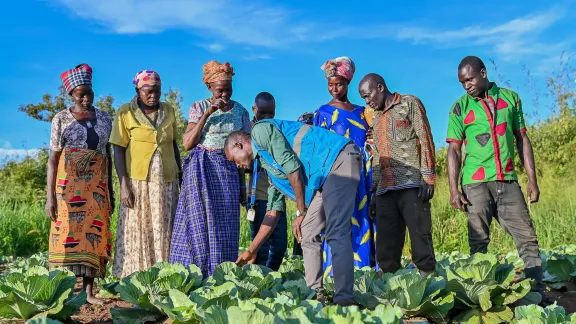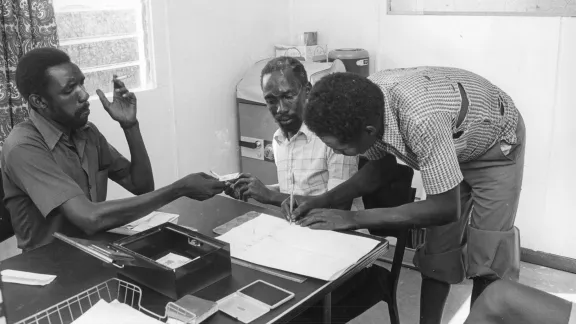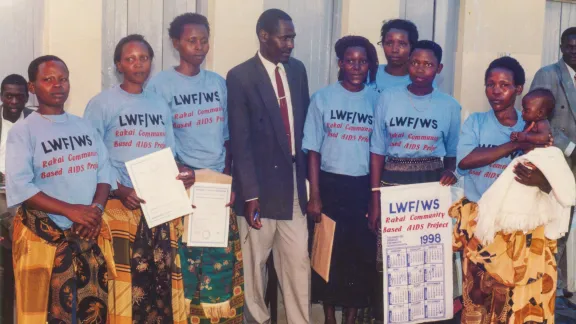
What began as urgent aid during a national crisis has evolved into livelihoods and protection work. As LWF Uganda marks its 45th anniversary, its legacy is evident in the thriving communities it has helped rebuild. Photo: LWF Uganda
From Emergency Relief to Empowerment
(LWI) - "The inheritance Uganda faced [...] was a bitter one: a totally disrupted infrastructure, an economy that had collapsed and widespread lack of security," begins the first Annual Report of the LWF Country Program in Uganda, written in 1981. What began as urgent aid during a national crisis efforts focused on building resilience and recovery. Today, as LWF Uganda marks its 45th anniversary, its legacy is evident in the thriving communities it has helped revive.
Emergency Relief
LWF started working in Uganda in 1979, shortly after the ousting of military dictator Idi Amin. The 1981 Annual Report notes the destruction caused by subsequent conflicts, including widespread looting and "a breakdown in law and order."
In response to famine and insecurity in the Karamoja region, LWF partnered with the Church of Uganda (COU) and the Uganda Council of Churches (UCC) to initiate emergency relief efforts, distributing food, medicine, and essential supplies. By 1981, these efforts had transformed into the Karamoja Emergency Development Program (KEDP), aimed at fostering self-reliance through sustainable agriculture.

LWF Uganda started its work in the Karamoja district. Pictured here is the LWF headquarters in Moroto. Photo: LWF Uganda
Internal and External Conflict
In the following years, LWF Uganda remained dedicated to the Karamoja community while playing a significant role in refugee settlement. Upon request from the United Nations High Commissioner for Refugees (UNHCR), LWF assisted in settling refugees from Sudan and Zaire (now the Democratic Republic of Congo) in Uganda's West Nile region by establishing reception centers and providing essential household items.
The 1980s also saw the insurgency of the Lord's Resistance Army (LRA), causing widespread internal displacement and prompting LWF to focus on assisting internally displaced persons (IDPs). Key initiatives, such as the Katakwi Emergency Response in 2004, provided clean water and sanitation facilities to over 21,000 IDPs while addressing food aid and the HIV/AIDS crisis in Sudan and Rakai.

A group of South Sudanese refugee women from the Kuku ethnic group - lead by Margaret Konga (centre) - dance and sing as they gather at the 'God's Grace' women's self-help group in the Palorinya refugee settlement. Palorinya is the second largest refugee settlement in Uganda. Photo: LWF/Albin Hillert

1998: Counseling courses for awareness building among HIV/AIDS affected persons. In this picture, newly trained LWF volunteer counselors are being awarded certificates after completing their one-year counseling courses. Photo: LWF Uganda
"Everything changed when LWF came into our lives," a resident of the Palabek refugee settlement reflects on a recent visit in August 2024, highlighting the close relationship between the local team and the communities they serve. LWF Uganda has consistently addressed immediate humanitarian needs and systemic issues. In 2010, it adopted a Rights-Based Approach to empower marginalized communities, encouraging them to advocate for their rights and engage in decision-making processes.
Commitment to Resilience
"Our presence in Uganda began out of necessity, driven by the dire needs of communities in crisis," says Adriana Franco Chitanana, the LWF Country Representative. "What started as emergency relief has blossomed into a long-term commitment to resilience; empowerment of women, youth, and children; and social cohesion within the communities we serve."
LWF Uganda has adapted its work to meet the evolving needs of the country, particularly with the growing refugee population. From supporting South Sudanese and Rwandan refugees in the 1990s to more recent efforts for Congolese refugees, LWF has provided protection, education, and livelihood opportunities. It has installed water systems, constructed many buildings for community services, and even set up an airstrip for the Adjumani refugee settlement's accessibility, and handed it over to district authorities. LWF's eco-friendly initiatives, including ecosystem restoration and deforestation reduction, have ensured long-term community resilience.
Credit to Host Communities
Mrs. Chitanana emphasizes LWF's adaptability, crediting its success to the support of Uganda's host communities. "Uganda's host communities have been instrumental in the success of refugee integration. Their willingness to share resources, land, and opportunities has created a unique environment of coexistence."
The resilience and strength of host communities and refugees took center stage at this year's Refugees Got Talent show in the Adjumani refugee settlement, launching the anniversary celebrations. The event showcased how refugees' determination, combined with the generosity of their hosts, is driving communities forward—transforming conflict into hope and paving the way for a brighter future.


